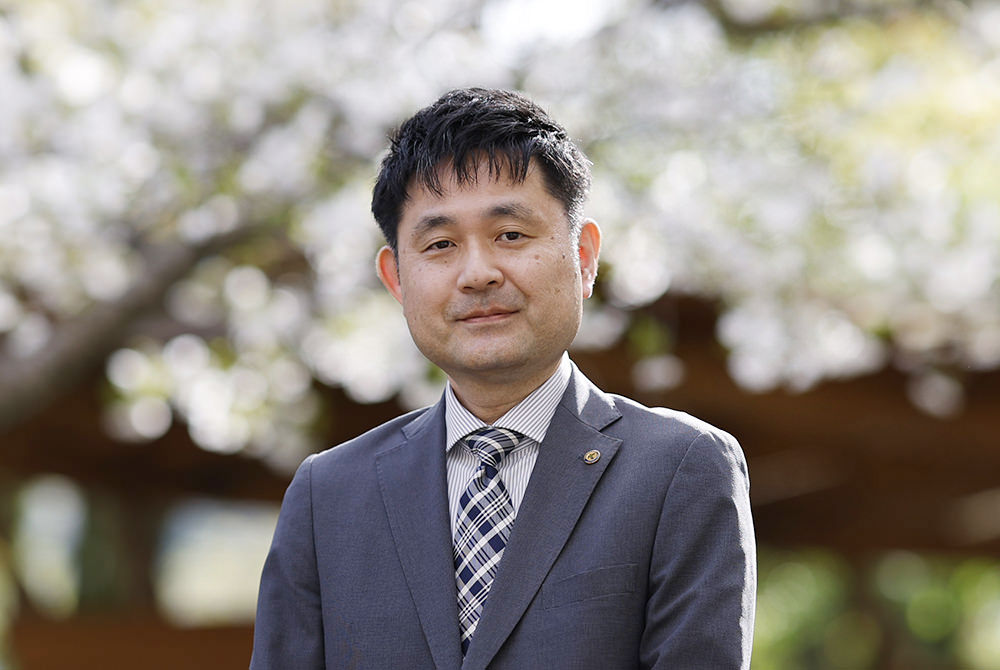Message from Dean
 TONAI Tetsuya
TONAI Tetsuya
In 1998, with the merger of the existing Graduate School of Law and Graduate School of Humanities, the current Graduate School of Humanities and Social Sciences was established with its 4 separate majors, Law, Economics and Social Systems, Humanistic-Environmental Cultural Science, and International Cultural Sciences. Along with the introduction of a PhD Regional Area Policy major in 2003, this graduate school offers a wide range of subjects and trains highly skilled, broad minded graduates.
While both undergraduate and graduate schools are a place of education and research, graduate schools have much more focus on research activities conducted by the students themselves. Also, even if the starting point of this research is based purely on the interests of the individual student, the results will eventually be required to contribute in some way to the development of society and culture. As we enter the 21st century, the world we live in still faces many serious problems, such as international conflicts, environmental issues, widening disparities, and social divisions. These issues are also very complex and with varying factors that do not allow for an easy solution. To solve these kinds of problems, skilled individuals who can investigate an issue from multiple angles and discover versatile solutions are required. The Graduate School of Humanities and Social Sciences is a place where both students and staff can study to become such a skilled individual and address the world’s problems.
Faculty Introduction
The Graduate School of Humanities and Social Sciences was established in 1998 through the merger of Kagoshima University’s existing Graduate School of Law, Economics and Social Systems (established in 1979) and Graduate School of Humanities and Social Sciences (established in 1986), which was undertaken to facilitate continued development. Currently, the Graduate School of Humanities and Social Sciences comprises four MA courses (Law, Economic and Social Systems, Humanistic-Environmental Cultural Science, and International Cultural Sciences), and one PhD program (Social Sciences). Within the PhD program, there are three courses of study: Regional Policy, Cultural Policy, and Islands Policy.
Besides undertaking high-level research and education in each individual specialist field, the Graduate School of Humanities and Social Sciences also undertakes practically-oriented research in close collaboration with local communities, with a particular focus on project-based research. In addition, we have adopted a proactive approach to the enrollment of mature students, by implementing a system that combines daytime and evening classes, and we provide classes on outlying islands through the Amami Access Centre (which opened on Amami-Oshima Island in 2004, followed by the establishment of a branch campus on Tokunoshima Island in 2007). Through initiatives such as these, we are proactively meeting the needs of adult learners who wish to take a Master’s degree or PhD.
Organization
MA Course
- Law
- Economic and Social systems
- Humanistic-Environmental Cultural Sciences
- International Cultural Sciences
PhD Course
- Social Sciences
Administrative Staff
|
Dean |
TONAI Tetsuya |
Western History; Medieval and Early Modern Italian History |
|
Associate |
OZAKI Takahiro |
Inner Asian Area Study |
Current Number of Staff
|
MA Course |
Law |
16 |
|
Economic and Social system |
24 | |
|
Humanistic-Environmental Cultural Science |
24 | |
|
International Cultural Sciences |
20 | |
|
PhD Course |
Social Sciences |
30 |
History
| March 1901 | Seventh Higher Zoushikan School Established |
| March 1946 | Renamed as the Seventh Higher School. |
| May 1949 | Kagoshima University Established. Using the Seventh Higher School’s general education course as a base, the Literature, Sociology and Science faculties were created. |
| April 1965 | Establishment of the Faculty of Law, Economics and Humanities with the law, economics and literature departments. |
| April 1979 | Introduction of post graduate law studies.
Literature Department restructured as the Humanities Department. |
| April 1986 | Introduction of humanities post graduate studies. |
| April 1997 | Departments restructured as the Law and Political Policy, Economic Information and Humanities. |
| April 1998 | Introduction of post graduate studies for Humanities and Social Science Department |
| April 2003 | Introduction of the Social Sciences PhD course. |
| April 2004 | Introduction of School of Law (Judiciary Policies) post graduate studies. |
| April 2007 | Introduction of post graduate studies in clinical psychology. |
| April 2017 | Faculty reorganizes into the Department of Law, Economics and Sociology (Course of Law, Course of Community Studies and Course of Economics) and the Department of Humanities (Course of Area and Cultural Studies and Course of Psychology) |
Facilities
The Regional Management Research Center
The Regional Management Research Center was established with the aim of contributing towards the development of management in the local community. The Centre’s objectives are not limited to strengthening business management in the community; the focus has been expanded to include supporting local government administration, and developing solutions for the various problems that affect Southern Kyushu.
Another objective of the Amami Access Centre is to provide support for Graduate School education in relation to the humanities and social sciences.
For information on the Regional Management Research Center please use the following link to Kagoshima University’s English Homepage
International Exchange, About our faculty International exchange
For information about international exchange activities and partner institutions, please visit the Kagoshima University home page.
https://www.kagoshima-u.ac.jp/en/international_coorperation_projects/